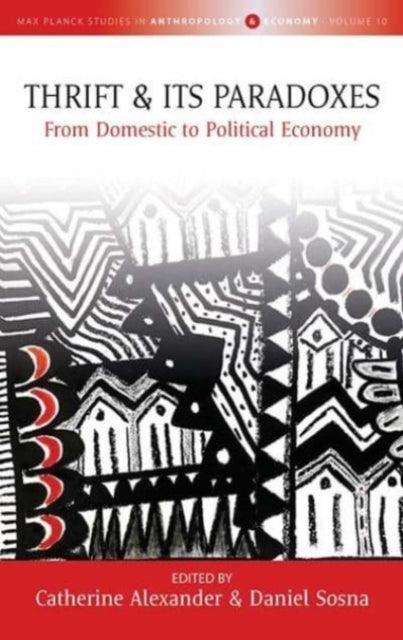Shulph Ink
Thrift and Its Paradoxes: From Domestic to Political Economy
Thrift and Its Paradoxes: From Domestic to Political Economy
- Condition: Brand new
- UK Delivery times: Usually arrives within 2 - 3 working days
- UK Shipping: Fee starts at £2.39. Subject to product weight & dimension
Bulk ordering. Want 15 or more copies? Get a personalised quote and bigger discounts. Learn more about bulk orders.
Couldn't load pickup availability
- More about Thrift and Its Paradoxes: From Domestic to Political Economy
In turbulent economic times, thrift becomes essential, reflecting an ancient ideal of household self-sufficiency and contrasting with wasteful present-focused growth. This book explores how practices and moralities of thrift are intertwined with austerity, debt, welfare, and patronage across social and temporal scales, constantly re-negotiated at the nexus of socio-economic, religious, and kinship ideals and praxis.
Format: Hardback
Length: 252 pages
Publication date: 08 April 2022
Publisher: Berghahn Books
Thrift is a crucial concern for many individuals, particularly during challenging economic times. It encompasses both an economic and ethical rationale for practicing frugality, saving, and minimizing waste to provide for long-term family care. These principles align with the ancient ideal of household self-sufficiency, offering a contrasting perspective to the wasteful, present-focused growth prevalent in capitalism. However, the concept of thrift has expanded beyond domestic matters, becoming a tool to justify public expenditure cuts. This book delves into the intricate relationship between practices and moralities of thrift, austerity, debt, welfare, and patronage across diverse social and temporal scales. It explores how these aspects are constantly re-negotiated at the intersection of socio-economic, religious, and kinship ideals and practices.
The practice of thrift has deep historical roots, dating back to ancient times when individuals and communities prioritized self-sufficiency and resource conservation. In times of scarcity, thrift was essential for survival and ensuring the well-being of future generations. Over time, this practice evolved and became intertwined with various cultural, religious, and social norms. In many societies, thrift was associated with religious teachings, emphasizing the importance of humility, generosity, and compassion towards others. For example, in Christianity, the virtue of poverty is emphasized, encouraging followers to live simply and give to the less fortunate. Similarly, in Islam, the concept of zakat (almsgiving) is central, urging Muslims to donate a portion of their wealth to support the poor and needy.
In addition to its religious and cultural significance, thrift has also played a crucial role in shaping economic systems. In traditional agrarian societies, for instance, thrift was essential for maintaining stability and ensuring food security. Farmers practiced crop rotation, saved seeds, and minimized waste to ensure a reliable supply of food for their families and communities. This practice not only sustained livelihoods but also contributed to the preservation of the land and natural resources.
However, as societies transitioned to more industrialized economies, the emphasis on thrift shifted. The rise of consumerism and the desire for instant gratification led to increased waste and consumption. The pursuit of material possessions and the constant need for new products created a culture of overproduction and wastefulness. This, in turn, led to environmental degradation, resource depletion, and social inequalities.
Recognizing the negative consequences of wasteful consumption, governments and organizations have increasingly promoted thrift and sustainable practices. The concept of "reduce, reuse, and recycle" has become widely recognized, encouraging individuals and businesses to minimize waste and maximize the use of resources. Governments have implemented policies and initiatives to promote energy efficiency, encourage recycling, and support sustainable agriculture.
Furthermore, the practice of thrift has also gained importance in the context of social welfare and poverty reduction. In many developing countries, poverty is a significant barrier to economic development and social progress. By promoting thrift and sustainable practices, individuals and communities can improve their economic opportunities and reduce their reliance on aid and subsidies. For example, in rural areas, the promotion of small-scale agriculture and the development of local markets can create employment opportunities and increase income levels.
In conclusion, thrift is a multifaceted concept that encompasses economic, ethical, and social dimensions. It has deep historical roots and has played a crucial role in shaping economic systems and promoting social welfare. In today's challenging economic times, thrift has become even more important as we strive to mitigate the negative consequences of wasteful consumption and promote sustainable development. By adopting practices and moralities of thrift, we can create a more equitable and sustainable future for ourselves and future generations.
Dimension: 229 x 152 (mm)
ISBN-13: 9781800734623
This item can be found in:
UK and International shipping information
UK and International shipping information
UK Delivery and returns information:
- Delivery within 2 - 3 days when ordering in the UK.
- Shipping fee for UK customers from £2.39. Fully tracked shipping service available.
- Returns policy: Return within 30 days of receipt for full refund.
International deliveries:
Shulph Ink now ships to Australia, Belgium, Canada, France, Germany, Ireland, Italy, India, Luxembourg Saudi Arabia, Singapore, Spain, Netherlands, New Zealand, United Arab Emirates, United States of America.
- Delivery times: within 5 - 10 days for international orders.
- Shipping fee: charges vary for overseas orders. Only tracked services are available for most international orders. Some countries have untracked shipping options.
- Customs charges: If ordering to addresses outside the United Kingdom, you may or may not incur additional customs and duties fees during local delivery.


